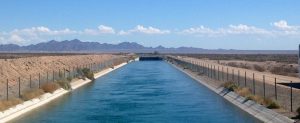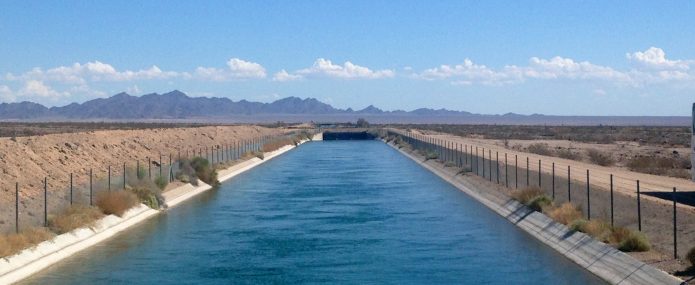
Pictured is MWD’s Colorado River Aqueduct through which conserved water from the Imperial Valley is delivered to the San Diego County Water Authority.
The California Supreme Court on Wednesday, Sept. 27, denied a petition by the San Diego County Water Authority to review an appellate court ruling in a case of statewide significance over rates set by the Los Angeles-based Metropolitan Water District of Southern California. It is also a matter with potential impacts to the Water Transfer Agreement and the Quantification Settlement Agreement as the rates in question pertain to the “wheeling” or conveyance of conserved transfer water from the Imperial Valley to San Diego.
After winning significant victories in the trial court and the appellate court, the Water Authority petitioned the state Supreme Court in July on one single question: whether MWD may add State Water Project supply costs to the price it charges to transport the Water Authority’s independent supplies of Colorado River water through MWD’s Colorado River Aqueduct. The trial court ruled MWD could not, but the Court of Appeal reversed that decision earlier this year. By denying review of the Water Authority’s petition, the Court of Appeal’s decision on this and all other issues it ruled on – including major victories for the Water Authority and its ratepayers – become final. Among the victories:
- MWD must pay the Water Authority approximately $51 million for so-called “Water Stewardship” charges MWD added to the transportation rates it charged the Water Authority from 2011-2014; the final amount of damages, including pre- and post-judgment interest, will be determined by the trial court on remand. The decision prevents MWD from imposing more than $20 million in illegal charges annually going forward. Through 2047, those unlawful charges would have amounted to approximately $1.1 billion.
- MWD unlawfully under-calculated the Water Authority’s statutory water right to MWD’s water supply; properly calculated, the Water Authority will be entitled to approximately 100,000 acre-feet of additional MWD water annually – about twice the production of the $1 billion Claude “Bud” Lewis Carlsbad Seawater Desalination Plant.
- A contract clause MWD used to disqualify local water supply projects in San Diego County from receiving funding from MWD was unconstitutional. Funding under MWD’s Local Resources Program is from rates charged by MWD. No agency has paid a greater share of MWD’s local projects’ funding. Yet, MWD used the illegal contract clause to prohibit the Water Authority and its member agencies from receiving funds for projects in San Diego County.
- The Water Authority believes it is entitled to recover attorneys’ fees from MWD, the final amount of which will be determined on remand to the Superior Court.
However, by denying the Water Authority’s petition, the state’s high court let stand the prior ruling by the Court of Appeal that allows MWD to include its State Water Project supply costs in the rates it charges to transport the Water Authority’s independent Colorado River supplies. The Court of Appeal’s ruling, which allows MWD to artificially inflate the supposed costs of “wheeling” while subsidizing the price of MWD’s own water for sale, will have a chilling effect on water transfers throughout California.
The Water Authority has two additional cases challenging MWD’s rates from 2015-2018 that have been stayed in Superior Court while the appellate proceedings were ongoing and are now expected to move forward again.
The litigation has roots in the 2003 Colorado River Quantification Settlement Agreement and the Water Authority’s historic water conservation-and-transfer agreement with the Imperial Irrigation District, the largest ag-to-urban water transfer in U.S. history. It provided the Water Authority with independent supplies from the Colorado River; however, the transfer required the use of MWD’s aqueduct and pipelines to move the water to San Diego.
When the Water Transfer Agreement was negotiated, the Water Authority challenged MWDs’ wheeling rates. As a result of that challenge, the Exchange Agreement with MWD for the conveyance of conserved water was set to end ten years earlier (2037) than the Water Transfer Agreement (2047). A timeline was established in which the Water Authority could make the unilateral decision whether to extend the Exchange Agreement by ten years or decrease the transfer by ten years.
December of this year is the deadline to make that decision, which now must take into consideration the impacts of the State Supreme Court Decision.
At the same time the Water Authority board is reviewing a decision on the Exchange Agreement—a review that now must take into consideration the impacts of the State Supreme Court decision—the board has also begun discussions on alternative conveyance methods. for conserved water from the Imperial Valley.
At a recent workshop, Water Authority staff presented three alternatives for a pipeline project between San Diego and the Imperial Valley. One would be an above-ground line that stretches from the San Vicente reservoir in San Diego to the western tail of the All-American Canal. The second would be an underground line that would connect to a parallel canal to the Westside Main Canal. A third option involves a joint binational conveyance system that would cross the international border into Mexico that would carry water west for both countries. Any option considered would have to go through an environmental review process and couldn’t move forward without an agreement between the Water Authority and IID.
These are not new concepts. There are studies dating back to the 1940s that look at similar alignments. However, considering the importance of the Water Transfer Agreement and the QSA, and the concerns regarding MWD’s rate structure, it has again become a worthwhile venture to consider these alternatives. If you have any questions, contact Water Authority staff member Darren Simon and dsimon@sdcwa.org or at 760.337.1386
